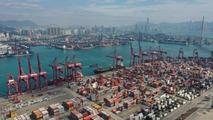 This February 28, 2022 aerial photo shows the container terminal at Tsing Yi in Hong Kong. (PETER PARKS / AFP)
This February 28, 2022 aerial photo shows the container terminal at Tsing Yi in Hong Kong. (PETER PARKS / AFP)
The value of Hong Kong's total goods exports dropped to HK$360.0 billion ($46.19 billion) in November, down 24.1 percent compared with the same period last year, the Census and Statistics Department said Thursday.
The value of imports of goods also decreased 20.3 percent over a year earlier to HK$387.1 billion for the same period, after a year-on-year decrease of 11.9 percent in October 2022. A visible trade deficit of HK$27.1 billion, equivalent to 7.0 percent of the value of imports of goods, was recorded in November.
For the first 11 months of 2022 as a whole, the value of total exports of goods dropped by 6.4 percent over the same period in 2021
Comparing the three-month period ending November 2022 with the preceding three months on a seasonally adjusted basis, the value of total exports of goods decreased by 5.0 percent while the value of imports of goods decreased by 4.9 percent.
ALSO READ: Hong Kong's exports value down 10.4% in October
For the first 11 months of 2022 as a whole, the value of total exports of goods dropped by 6.4 percent over the same period in 2021. Concurrently, the value of imports of goods decreased by 5.4 percent. A visible trade deficit of HK$343.7 billion, equivalent to 7.6 percent of the value of imports of goods, was recorded in the first 11 months of 2022.
In a statement, a Hong Kong Special Administrative Region government spokesman said that the year-on-year fall in the value of merchandise exports widened in November amid the deteriorating external environment and disruptions to cross-boundary land transportation.
Exports to the Chinese mainland, the United States and the European Union continued to register double-digit declines. Exports to most other major Asian markets saw worsened performance, the spokesman said.
READ MORE: Finance chief: HK exports face pressure amid global rate hikes
He said Hong Kong's export performance will continue to face huge challenges in the near term, as monetary policy tightening in advanced economies further dampens demand.
Nonetheless, the recent relaxation of cross-boundary land transportation restrictions may offset some of the pressures, he added.


